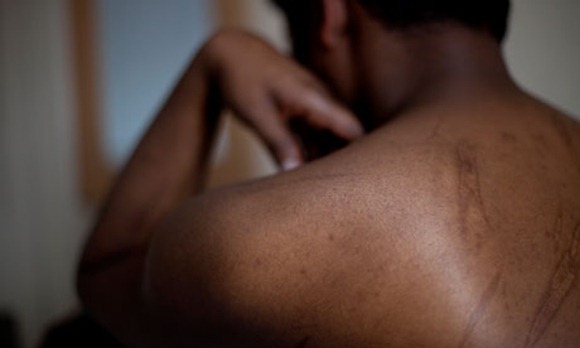Asylum seekers are not being given the protection they need in the UK, as the torture of ‘Hari’ returned to Sri Lanka has shown
 ‘Hari’ was deported back to Sri Lanka, where he claims he was beaten with electrical wire and burned with cigarettes. Photograph: Teri Pengilley for the Guardian
‘Hari’ was deported back to Sri Lanka, where he claims he was beaten with electrical wire and burned with cigarettes. Photograph: Teri Pengilley for the Guardian
The horrifying testimony of Hari, a Tamil man tortured by Sri Lankan officials after the UK sent him back to his country, is one more shameful example of how this country currently treats people who seek safety here. Given the distressing description of Hari’s 17-day torture ordeal and the methods used, who can blame him for holding the UK government responsible for the scars on his back?
Evidence that shows it is unsafe to return people to Sri Lanka grows by the day. Just last week, the UK’s high court stopped the removal of 40 refused asylum seekers to Sri Lanka on the grounds that their human rights would be violated. Human Rights Watch have this year alone reported 13 cases of refused asylum seekers who have been tortured on return to the country, and have called for the UK to halt all returns. The charity Freedom From Torture has consistently raised this as a serious issue, with a "steady stream" of clients who have been recently tortured, including individuals who were forcibly removed to Sri Lanka from the UK.
The human cost of sending people back to Sri Lanka can no longer be ignored, and it’s clear the UK government should stop removals without delay. Yet the message does not seem to be getting through. The Home Office’s response to this appalling story – that it will continue to return people "who do not have a genuine need for our protection" – is simply unacceptable. By this it means it will not only continue to return people to Sri Lanka, but also to other countries where torture and human rights abuses are well documented, such as Afghanistan and the Democratic Republic of the Congo. Why can’t the government acknowledge the situation in these countries and halt returns, offering some form of protection to people who have been refused asylum until it is safe to go back?
Like many of the asylum seekers we see at the Refugee Council, Hari gave evidence to show he had been tortured and beaten in his own country, but he was still refused asylum. Every day we work with women who, despite surviving sexual violence in their own country, are refused asylum here. Of the women accessing our therapeutic services in 2010-11, more than 30% were from Sri Lanka, the vast majority had been tortured or raped, and just under half had been refused asylum in the UK.
The Home Office’s own statistics show that it is often very difficult for people seeking asylum here to get the protection they need. In 2011, out of 17,496 decisions made on asylum applications, 68% were refusals. Of those that appealed, 26% were overturned, showing that at least a quarter of people were given a wrong decision in the first instance. Refusal rates are also higher for women – in particular, 80-89% of women’s claims from Sri Lanka were rejected each year between 2006 and 2010. It is clear that too many people are being wrongly refused asylum in the first place.
While the UK Border Agency (UKBA) has made some steps in recent years to ensure the right decisions are made first time round, a number of flaws remain. In particular, a lack of access to good-quality legal representation throughout the asylum process means people are not supported to give all the information they need to back up their claim, and this is getting worse following recent cuts to legal aid. Vulnerable groups face particular problems in getting their claims recognised because the system is not set up for their specific needs: women, for example, who need to disclose traumatic and personal information to support their claims, often struggle to access female interviewers and interpreters. There is often a lack of awareness about the situation for women in their countries of origin. Many of our clients also cite being met with a culture of disbelief by immigration officials, which puts them at an immediate disadvantage.
As a result, the UKBA is failing to identify people who are at risk of torture, persecution or worse, on return to their own country, and are wrongly refusing people the protection they need. We want the UKBA to urgently develop policies and practices that reflect the reality of the situation in the country of origin for all asylum seekers, and to recognise that the situation in some countries is particularly dangerous for women.
(For updates you can share with your friends, follow TNN on Facebook and Twitter )
